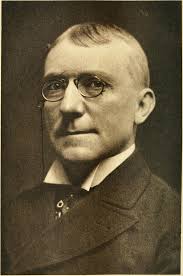Armazindy Page #5
James Whitcomb Riley poems book published in the 1894 book Armazindy and received very negative reviews that referred to poems like "The Little Dog-Woggy" and "Jargon-Jingle" as "drivel" and to Riley as a "worn out genius". Most of his growing number of critics suggested that he ignored the quality of the poems for the sake of making money.
Were bowed to her.—But O my friends, My hopes went up—my heart went down— When Maimie married—Charley Brown! “THIS DEAR CHILD-HEARTED WOMAN THAT IS DEAD” I This woman, with the dear child-heart, Ye mourn as dead, is—where and what? With faith as artless as her Art, I question not,— But dare divine, and feel, and know Her blessedness—as hath been writ In allegory.—Even so I fashion it:— II A stately figure, rapt and awed In her new guise of Angelhood, Still lingered, wistful—knowing God Was very good.— Her thought’s fine whisper filled the pause; And, listening, the Master smiled, And lo! the stately angel was —A little child. TO A POET-CRITIC Yes,—the bee sings—I confess it— Sweet as honey—Heaven bless it!— Yit he’d be a sweeter singer Ef he didn’t have no stinger. AN OLD-TIMER Here where the wayward stream Is restful as a dream, And where the banks o’erlook A pool from out whose deeps My pleased face upward peeps, I cast my hook. Silence and sunshine blent!— A Sabbath-like content Of wood and wave;—a free- Hand landscape grandly wrought Of Summer’s brightest thought And mastery.— For here form, light and shade, And color—all are laid With skill so rarely fine, The eye may even see The ripple tremblingly Lip at the line. I mark the dragon-fly Flit waveringly by In ever-veering flight, Till, in a hush profound, I see him eddy round The “cork,” and—’light! Ho! with the boy’s faith then Brimming my heart again, And knowing, soon or late, The “nibble” yet shall roll Its thrills along the pole, I—breathless—wait. THE SILENT VICTORS MAY 30, 1878 “Dying for victory, cheer on cheer Thundered on his eager ear.” CHARLES L. HOLSTEIN. I Deep, tender, firm and true, the Nation’s heart Throbs for her gallant heroes passed away, Who in grim Battle’s drama played their part, And slumber here to-day.— Warm hearts that beat their lives out at the shrine Of Freedom, while our country held its breath As brave battalions wheeled themselves in line And marched upon their death: When Freedom’s Flag, its natal wounds scarce healed, Was torn from peaceful winds and flung again To shudder in the storm of battle-field— The elements of men,— When every star that glittered was a mark For Treason’s ball, and every rippling bar Of red and white was sullied with the dark And purple stain of war: When angry guns, like famished beasts of prey, Were howling o’er their gory feast of lives, And sending dismal echoes far away To mothers, maids, and wives:— The mother, kneeling in the empty night, With pleading hands uplifted for the son Who, even as she prayed, had fought the fight— The victory had won: The wife, with trembling hand that wrote to say The babe was waiting for the sire’s caress— The letter meeting that upon the way,— The babe was fatherless: The maiden, with her lips, in fancy, pressed Against the brow once dewy with her breath, Now lying numb, unknown, and uncaressed Save by the dews of death. II What meed of tribute can the poet pay The Soldier, but to trail the ivy-vine Of idle rhyme above his grave to-day In epitaph design?— Or wreathe with laurel-words the icy brows That ache no longer with a dream of fame, But, pillowed lowly in the narrow house, Renown’d beyond the name. The dewy tear-drops of the night may fall, And tender morning with her shining hand May brush them from the grasses green and tall That undulate the land.— Yet song of Peace nor din of toil and thrift, Nor chanted honors, with the flowers we heap, Can yield us hope the Hero’s head to lift Out of its dreamless sleep: The dear old flag, whose faintest flutter flies A stirring echo through each patriot breast, Can never coax to life the folded eyes That saw its wrongs redressed— That watched it waver when the fight was hot, And blazed with newer courage to its aid, Regardless of the shower of shell and shot Through which the charge was made;— And when, at last, they saw it plume its wings, Like some proud bird in stormy element, And soar untrammelled on its wanderings, They closed in death, content. III O mother, you who miss the smiling face Of that dear boy who vanished from your sight, And left you weeping o’er the vacant place He used to fill at night,— Who left you dazed, bewildered, on a day That echoed wild huzzas, and roar of guns That drowned the farewell words you tried to say To incoherent ones;— Be glad and proud you had the life to give— Be comforted through all the years to come,— Your country has a longer life to live, Your son a better home. O widow, weeping o’er the orphaned child, Who only lifts his questioning eyes to send A keener pang to grief unreconciled,— Teach him to comprehend He had a father brave enough to stand Before the fire of Treason’s blazing gun, That, dying, he might will the rich old land Of Freedom to his son. And, maiden, living on through lonely years In fealty to love’s enduring ties,— With strong faith gleaming through the tender tears That gather in your eyes, Look up! and own, in gratefulness of prayer, Submission to the will of Heaven’s High Host:— I see your Angel-soldier pacing there, Expectant at his post.— I see the rank and file of armies vast, That muster under one supreme control; I hear the trumpet sound the signal-blast— The calling of the roll— The grand divisions falling into line And forming, under voice of One alone, Who gives command, and joins with tongue divine The hymn that shakes the Throne. IV And thus, in tribute to the forms that rest In their last camping-ground, we strew the bloom And fragrance of the flowers they loved the best, In silence o’er the tomb. With reverent hands we twine the Hero’s wreath And clasp it tenderly on stake or stone That stands the sentinel for each beneath Whose glory is our own. While in the violet that greets the sun, We see the azure eye of some lost boy; And in the rose the ruddy cheek of one We kissed in childish joy,— Recalling, haply, when he marched away, He laughed his loudest though his eyes were wet.— The kiss he gave his mother’s brow that day Is there and burning yet: And through the storm of grief around her tossed, One ray of saddest comfort she may see,— Four hundred thousand sons like hers were lost To weeping Liberty. ... But draw aside the drapery of gloom, And let the sunshine chase the clouds away And gild with brighter glory every tomb
Translation
Translate and read this book in other languages:
Select another language:
- - Select -
- 简体中文 (Chinese - Simplified)
- 繁體中文 (Chinese - Traditional)
- Español (Spanish)
- Esperanto (Esperanto)
- 日本語 (Japanese)
- Português (Portuguese)
- Deutsch (German)
- العربية (Arabic)
- Français (French)
- Русский (Russian)
- ಕನ್ನಡ (Kannada)
- 한국어 (Korean)
- עברית (Hebrew)
- Gaeilge (Irish)
- Українська (Ukrainian)
- اردو (Urdu)
- Magyar (Hungarian)
- मानक हिन्दी (Hindi)
- Indonesia (Indonesian)
- Italiano (Italian)
- தமிழ் (Tamil)
- Türkçe (Turkish)
- తెలుగు (Telugu)
- ภาษาไทย (Thai)
- Tiếng Việt (Vietnamese)
- Čeština (Czech)
- Polski (Polish)
- Bahasa Indonesia (Indonesian)
- Românește (Romanian)
- Nederlands (Dutch)
- Ελληνικά (Greek)
- Latinum (Latin)
- Svenska (Swedish)
- Dansk (Danish)
- Suomi (Finnish)
- فارسی (Persian)
- ייִדיש (Yiddish)
- հայերեն (Armenian)
- Norsk (Norwegian)
- English (English)
Citation
Use the citation below to add this book to your bibliography:
Style:MLAChicagoAPA
"Armazindy Books." Literature.com. STANDS4 LLC, 2025. Web. 9 Mar. 2025. <https://www.literature.com/book/armazindy_946>.








Discuss this Armazindy book with the community:
Report Comment
We're doing our best to make sure our content is useful, accurate and safe.
If by any chance you spot an inappropriate comment while navigating through our website please use this form to let us know, and we'll take care of it shortly.
Attachment
You need to be logged in to favorite.
Log In